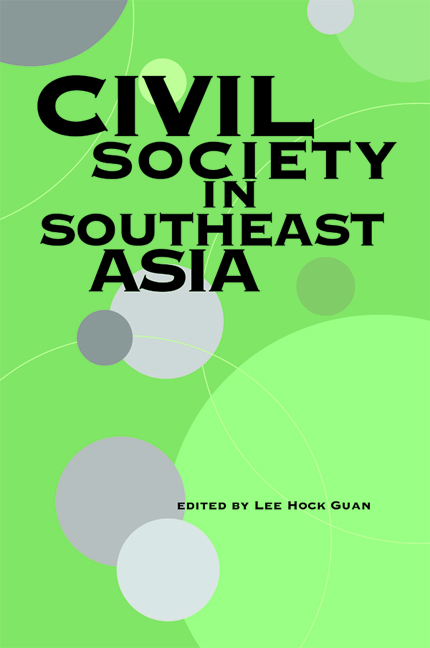Book contents
- Frontmatter
- Contents
- Preface
- About the Contributors
- 1 Introduction: Civil Society in Southeast Asia
- 2 Islam, Constitutional Democracy, and the Islamic State in Malaysia
- 3 Cracks in the Wall of Separation?: The Church, Civil Society, and the State in the Philippines
- 4 New Buddhism, Urban Space, and Virtual Civil Society
- 5 Women's Movement in the Philippines and the Politics of Critical Collaboration with the State
- 6 Participation of the Women's Movement in Malaysia: The 1999 General Election
- 7 Civil Society Effectiveness and the Vietnamese State — Despite or Because of the Lack of Autonomy
- 8 Relationship between State and Civil Society in Singapore: Clarifying the Concepts, Assessing the Ground
- 9 Civil Society in Malaysia: An Arena of Contestations?
- 10 Ethnicity and the Civil Rights Movement in Indonesia
- 11 Civil Society Discourse and the Future of Radical Environmental Movements in Thailand
- Index
9 - Civil Society in Malaysia: An Arena of Contestations?
Published online by Cambridge University Press: 03 November 2017
- Frontmatter
- Contents
- Preface
- About the Contributors
- 1 Introduction: Civil Society in Southeast Asia
- 2 Islam, Constitutional Democracy, and the Islamic State in Malaysia
- 3 Cracks in the Wall of Separation?: The Church, Civil Society, and the State in the Philippines
- 4 New Buddhism, Urban Space, and Virtual Civil Society
- 5 Women's Movement in the Philippines and the Politics of Critical Collaboration with the State
- 6 Participation of the Women's Movement in Malaysia: The 1999 General Election
- 7 Civil Society Effectiveness and the Vietnamese State — Despite or Because of the Lack of Autonomy
- 8 Relationship between State and Civil Society in Singapore: Clarifying the Concepts, Assessing the Ground
- 9 Civil Society in Malaysia: An Arena of Contestations?
- 10 Ethnicity and the Civil Rights Movement in Indonesia
- 11 Civil Society Discourse and the Future of Radical Environmental Movements in Thailand
- Index
Summary
INTRODUCTION
Academic interest in theorizing about civil society would not have come about without certain empirical developments in the last two decades or so. Specifically, the struggle initiated by non-state forces against the authoritarian regimes in Eastern Europe, Latin America, and parts of Asia made clear that civil society could play an important role in the democratization process. Furthermore, the failure of certain well-established democratic regimes to alleviate problems of poverty and income distribution and to bring about a more participatory political process served to rekindle hopes in societal organizations that were relatively independent of the state (Joseph 2002).1 While empirical developments served to highlight the significance of civil society in addressing the problems overlooked by authoritarian and formally constituted democratic regimes, conceptualizing and defining civil society continued to be fraught with difficulties. As such, currently there is still no common agreement as to what is civil society and how it will serve the normative requirements of democracy and good governance.
This chapter has a number of objectives. First, it will discuss the dominant conceptions of what is civil society by considering the liberal and Marxist positions. These two theoretical paradigms are by no means homogeneous as there are different strands within each of them in terms of how they conceptualized the notion of civil society. Second, an alternative perspective on civil society would be provided by considering the merits of the Gramscian thesis which argues that civil society should be understood as the terrain of contestation between hegemonic and counter-hegemonic forces (Gramsci 1975). Third, there will be a brief discussion about the nature of scholarly discourse on democracy and its relationship to civil society in Malaysia. Fourth, this chapter will seek to ascertain the relevance of the alternative Gramscian approach to understanding the nature of civil society in Malaysia (Gramsci 1975).
CONCEPTUALIZING CIVIL SOCIETY
The mainstream or liberal position on civil society argues that the general welfare of society and the process of democratization are enhanced if groups, organizations, and associations act as a buffer to prevent the state from assuming too much control of society. Essential to the liberal idea of a vibrant and democratically organized civil society is that citizens “collectively act in the public sphere to express their interests, passions, exchange information, achieve mutual goals, make demands on the state, and hold state officials accountable” (Diamond 1994, p. 3).
- Type
- Chapter
- Information
- Civil Society in Southeast Asia , pp. 198 - 216Publisher: ISEAS–Yusof Ishak InstitutePrint publication year: 2004

